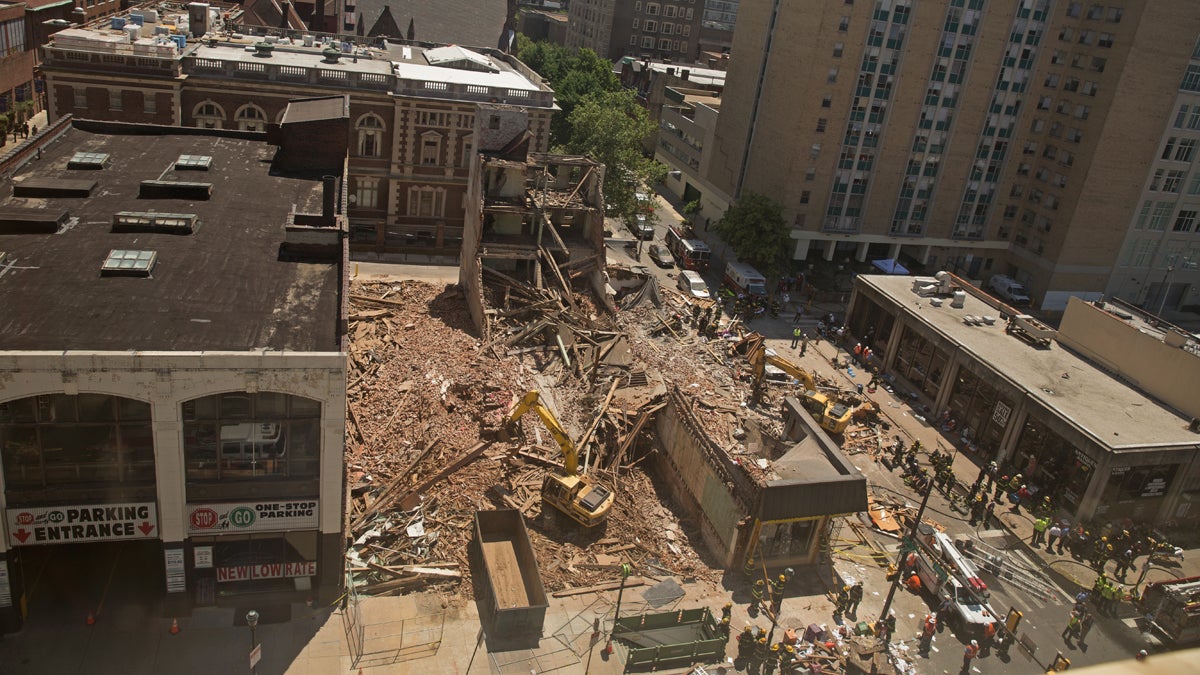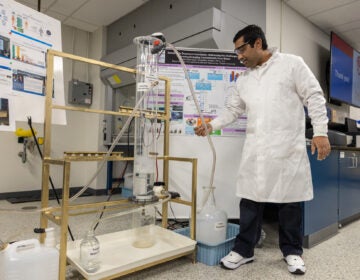Record settlement announced in 2013 Center City building collapse

A four-story building collapsed onto the nearby Salvation Army Thrift Store at 22nd and Market streets on Wednesday
Attorneys representing the victims of a 2013 building collapse in Philadelphia that left seven people dead have reached a $227 million settlement — believed to be the largest personal injury payout in Pennsylvania history – with the multimillionaire developer and others who civil jurors last month found liable for the tragedy.
Damages will be distributed to 19 plaintiffs who sued after the Salvation Army Thrift Store at 22nd and Market streets in Center City collapsed onto shoppers and employees on June 5, 2013, as a construction crew demolished a building next door. Six people — customers Anne Bryan, 24, an art student; her friend Mary Simpson, 24, an audio engineer; Juanita Harmon, 75, a retired secretary; Roseline Conteh, 52, a nurse and immigrant from Sierra Leone; and employees Bobor Davis, 68; and Kimberly Finnegan, 35, a cashier who was on her first day on the job — died in the collapse. A seventh (Danny Johnson, 59, a truck driver who was shopping in the store) died three weeks afterward, and 13 people suffered serious injuries.
The settlement came after a five-month civil trial that ended late last month, when a jury found six defendants financially liable for the collapse.
Those ordered to pay the settlement are: Richard Basciano, 91, the New York real estate mogul who owned the adjacent four-story building under demolition; Plato Marinakos Jr., the architect hired by Basciano to oversee the project; and the Salvation Army. Jurors found the Salvation Army and Basciano to be most liable.
Two men — contractor Griffin Campbell and excavator operator Sean Benschop — both already are serving long prison sentences for manslaughter and related offenses. In the civil case, they were found less liable than Basciano, Marinakos, and the Salvation Army, none of whom were criminally charged. (The District Attorney’s Office granted Marinakos immunity from criminal prosecution for testifying before a grand jury.)
Attorneys Robert J. Mongeluzzi, Steven G. Wigrizer, Harry M. Roth, Jeffrey P. Goodman, Adam E. Grutzmacher, Jason S. Weiss, and James G. Begley, who represented families of the seven who died and half of the injured survivors, announced the settlement today.
The attorneys established during the civil trial that multiple people involved in the project had some inkling of its imminent collapse. Basciano’s company STB Investments, for example, emailed the Salvation Army five times in the weeks before the tragedy warning of a “threat to life and limb” and the potential of an “uncontrolled collapse.” Attorneys argued that STB used inexperienced workers to dismantle the old Hoagie City building, and the collapse occurred when a freestanding, 30-foot wall toppled onto the one-story thrift shop next door.
In a statement, the Salvation Army said today: “Our deepest sympathy remains with the victims and their families through this extremely difficult time. We pray for the healing of our community. The Salvation Army continues to serve those in need, with compassion, as we have for more than 137 years in Philadelphia.”
But Nancy Winkler and Jay Bryan, whose daughter died in the collapse, said healing will be forever elusive.
“We will never get over Anne’s tragic death,” the couple said in a statement. “This trial, for the first time, shed light on the full story of how and why the collapse — which was so preventable — occurred. We will forever miss Anne, but we will also be eternally grateful for the work of the jury. They sent a strong message that owners have an absolute duty to protect public safety above all.”
Attorney Wigrizer agreed: “No amount of money can erase the heartache that comes with the loss of life, but at least this settlement avoids what would certainly have been a future — perhaps years — filled with added pain through the inevitable and seemingly endless appeals process.”
Francis Sankoh, victim Conteh’s son, added: “It’s tough to lose somebody, but to lose somebody under those circumstances, it’s life-changing … This loss has left a very big void in our family. It’s something that we are learning every day to cope with.”
Attorney Mongeluzzi called the settlement “epic in dimension, fair, just, and, most importantly, a powerful deterrent to all those in any business or organization, at any level, whether they wear a suit or a uniform, who try to cut corners, save a buck, shove safety aside and put human life at risk.”
Settlement proceeds will split among plaintiffs through an arbitration process.
WHYY is your source for fact-based, in-depth journalism and information. As a nonprofit organization, we rely on financial support from readers like you. Please give today.




